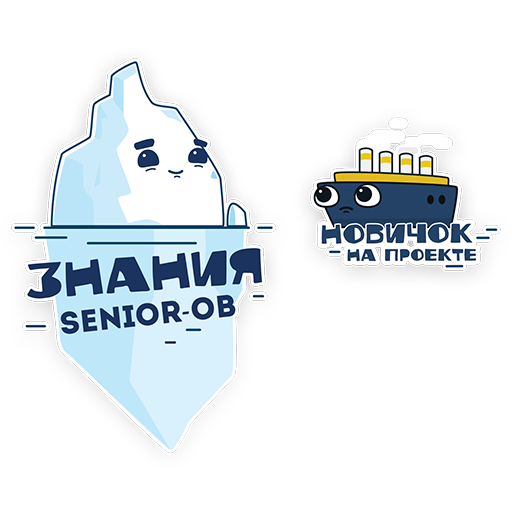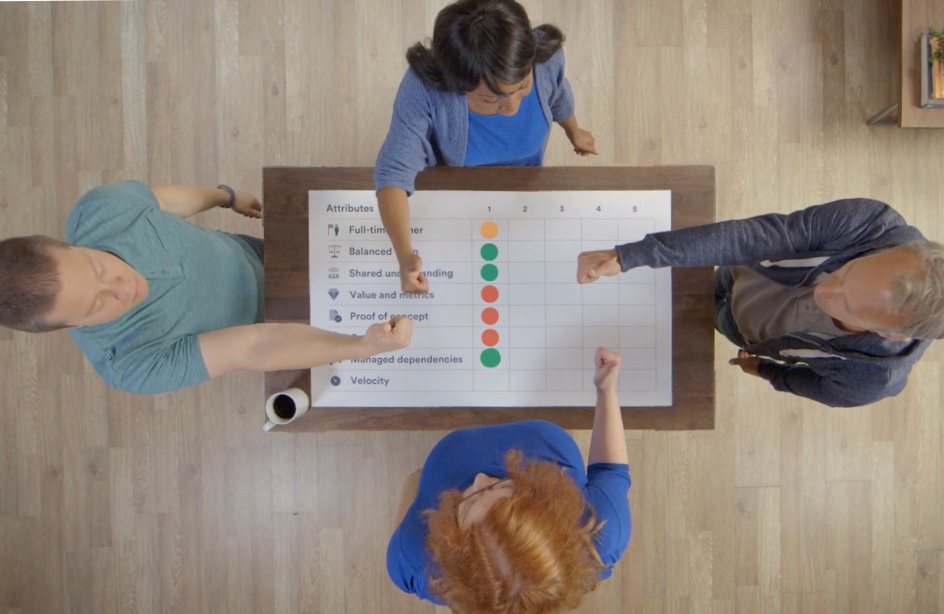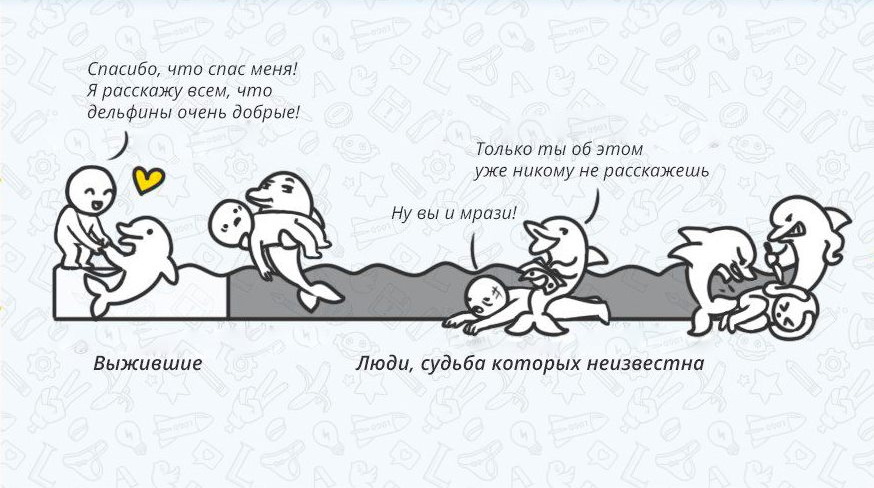We build models, “sell” management knowledge management and correct the survivor’s mistake.
Recently, I spoke about the reports that formed the conference program about knowledge management in IT companies KnowledgeConf. But not a single report, all the same, the most important thing at the conference is the communication of experts, discussions, a clash of opinions, at the junction of which something new, interesting and breakthrough occurs. Therefore, in parallel in the program we will have four two-hour interactive formats - two round tables and two master classes.

Let's start with the most interactive formats. The first in the program will be the Atlassian Team Playbook master class, which is very conducive to awakening , learn new development practices for your team! From Anna Zekunova and Irina Pozdnyakova from ToolsTrek, a company that implements Atlassian products, including everyone's favorite Confluence.
The Atlassian Team Playbook is a collection of team health monitors that is accompanied by games to develop various aspects of teamwork. Initially, it was the internal Atlassian framework, but, having achieved quite good results within the company, they decided to share it with the IT world. At the master class, participants will be divided into project teams, each team will receive a pre-prepared case, and each participant will describe his role.
')
Participants will follow a team health monitor and play a game to improve work efficiency.

By the way, this practice is quite possible to adopt and try inside your company, all materials Atlassian laid out in open access .
The second interactive format is the workshop “Model in any context” from the trainer on applied rationality, co-founder of the Center for Applied Rationality “Kocherga”, Praion Medvedeva . Models are very common among IT professionals, we often model or think that we model in work situations, but models do not boil down to drawing diagrams in UML notation.
Praion will tell and show in practice how to apply model building skills with causal relationships and dependencies, even in situations and contexts where you usually do not do it, like on agile plannings, while thinking through the development process, division of responsibility or system architecture.
On real-life cases that participants in a mitap encounter, Praionpion will show how to transfer the skills of modeling and ontological work from areas where you already know how to everything else.
Among the conference participants there are those who make the first steps in knowledge management, but there will be those who have already achieved certain results. And the further we progress in this process, the more necessary is the support of the leadership and distinct metrics to assess the effectiveness of our work.
When you develop knowledge management processes, you are a kind of KM evangelist, sooner or later you will have to look for like-minded people, both among your closest colleagues and among management, who can allocate resources and act as a "patron" of the initiative. Knowledge management cannot be built without one or the other. Accordingly, you, as a driver for the initiative, will in any case “sell” your idea twice: to line colleagues and superiors.

Can the same arguments convince both colleagues and managers? Which methods are better suited for both cases, and which are different? How to overcome resistance and arguments of the form "it was normal?"
The discussion “How to sell knowledge management ideas to management and colleagues” from Kaspersky Lab’s training and certification team leader Rodion Nagornov aims to discuss and get a list or even a script to sell knowledge management ideas in your company with a list of possible objections, counter arguments on as well as a list of metrics that can justify the importance of knowledge management practices.
We will certainly share this “artifact” after the conference, but better come and help us create it together.
The productive day will be completed by our experimental format - the collective dreaming session “Technologies of the future for knowledge management” . The event will focus on how to fill the gap between what knowledge management tasks I would like to solve automatically, and what technologies and how you can use it for this.
We will discuss problems in the field of knowledge management and fantasize about how modern technologies (AI, web, data mining, natural language processing, computer vision, etc.) can solve such problems. Together we can look at the problem from different angles and think about possible solutions.

We would like the participants to come to the session with a little bit of preparation, throwing a list of problems that exist in knowledge management in IT companies (for example, initial filling of the knowledge base, content obsolescence and checking its completeness, semantic search, user involvement, etc.) , or having studied what technologies, research and concepts already exist in the field of ML, AI, NLP, for example, here , and what are their features and limitations.
The best result of such a session, and of our entire conference, will be the real Proof of Concept , if one of the engineers from startups takes and tries to put the proposed ideas into practice. Following the session, we will definitely create a manifesto with ideas and implementation options, it can be taken and started to implement.
The session will be moderated by Igor Zupko, director for Unknown in the company of the Fant, and Maxim Leonovich , co-founder of the OneBar startup, will be among the experts. Maxim's company creates and develops a solution that is able to process conversations in the Slack corporate messenger and creates a base of knowledge and questions and answers based on them. Of course, our speakers and PC members will join the collective dream: Maxim Tsepkov, Grigory Petrov, Ekaterina Gudkova and Alexey Sidorin.
I have already said that we received 83 applications for reports, which means that we had to reject five dozen applications . Just imagine, five dozen reports that you will not hear.

Everyone always talks only about the accepted reports, such a “systematic error of the survivor”, but among the unaccepted reports there is also a lot of quality material, so we decided to collect the most interesting thoughts and ideas from the reports that did not fit into the program.

If the conference in the future grows into a two-day format (and this is only possible through our joint efforts), then you have a chance to hear these thoughts in a detailed format. In the meantime, I just bring them without specifying the authors.
I would be grateful if you would write what thoughts from the unaccepted applications you would like to disclose in more detail, argue with them, hear more fully in the report - we will definitely invite these speakers for next year.
During the break, you can walk around the exhibition area - this is the conference partners area, where you can learn about interesting projects, news, technologies, socialize and make appointments.
In addition, we invited to the conference representatives of the thematic communities in the field of knowledge management and e-learning, authors of Telegram channels, video blogs and podcasts, for example, KM Alliance, Knowledge Management - North-West, Conveerum, Write the Docs Russia, LX Notes, Yel - ELearning skills, St. Petersburg analyst community. Communicate and make connections.

Improving team health and learning how to build models
Let's start with the most interactive formats. The first in the program will be the Atlassian Team Playbook master class, which is very conducive to awakening , learn new development practices for your team! From Anna Zekunova and Irina Pozdnyakova from ToolsTrek, a company that implements Atlassian products, including everyone's favorite Confluence.
The Atlassian Team Playbook is a collection of team health monitors that is accompanied by games to develop various aspects of teamwork. Initially, it was the internal Atlassian framework, but, having achieved quite good results within the company, they decided to share it with the IT world. At the master class, participants will be divided into project teams, each team will receive a pre-prepared case, and each participant will describe his role.
')
Participants will follow a team health monitor and play a game to improve work efficiency.

By the way, this practice is quite possible to adopt and try inside your company, all materials Atlassian laid out in open access .
The second interactive format is the workshop “Model in any context” from the trainer on applied rationality, co-founder of the Center for Applied Rationality “Kocherga”, Praion Medvedeva . Models are very common among IT professionals, we often model or think that we model in work situations, but models do not boil down to drawing diagrams in UML notation.
Praion will tell and show in practice how to apply model building skills with causal relationships and dependencies, even in situations and contexts where you usually do not do it, like on agile plannings, while thinking through the development process, division of responsibility or system architecture.
On real-life cases that participants in a mitap encounter, Praionpion will show how to transfer the skills of modeling and ontological work from areas where you already know how to everything else.
“Sell” the idea of knowledge management to management and colleagues
Among the conference participants there are those who make the first steps in knowledge management, but there will be those who have already achieved certain results. And the further we progress in this process, the more necessary is the support of the leadership and distinct metrics to assess the effectiveness of our work.
When you develop knowledge management processes, you are a kind of KM evangelist, sooner or later you will have to look for like-minded people, both among your closest colleagues and among management, who can allocate resources and act as a "patron" of the initiative. Knowledge management cannot be built without one or the other. Accordingly, you, as a driver for the initiative, will in any case “sell” your idea twice: to line colleagues and superiors.

Can the same arguments convince both colleagues and managers? Which methods are better suited for both cases, and which are different? How to overcome resistance and arguments of the form "it was normal?"
The discussion “How to sell knowledge management ideas to management and colleagues” from Kaspersky Lab’s training and certification team leader Rodion Nagornov aims to discuss and get a list or even a script to sell knowledge management ideas in your company with a list of possible objections, counter arguments on as well as a list of metrics that can justify the importance of knowledge management practices.
We will certainly share this “artifact” after the conference, but better come and help us create it together.
We dream of applying technology for the benefit of knowledge management
The productive day will be completed by our experimental format - the collective dreaming session “Technologies of the future for knowledge management” . The event will focus on how to fill the gap between what knowledge management tasks I would like to solve automatically, and what technologies and how you can use it for this.
We will discuss problems in the field of knowledge management and fantasize about how modern technologies (AI, web, data mining, natural language processing, computer vision, etc.) can solve such problems. Together we can look at the problem from different angles and think about possible solutions.

We would like the participants to come to the session with a little bit of preparation, throwing a list of problems that exist in knowledge management in IT companies (for example, initial filling of the knowledge base, content obsolescence and checking its completeness, semantic search, user involvement, etc.) , or having studied what technologies, research and concepts already exist in the field of ML, AI, NLP, for example, here , and what are their features and limitations.
The best result of such a session, and of our entire conference, will be the real Proof of Concept , if one of the engineers from startups takes and tries to put the proposed ideas into practice. Following the session, we will definitely create a manifesto with ideas and implementation options, it can be taken and started to implement.
The session will be moderated by Igor Zupko, director for Unknown in the company of the Fant, and Maxim Leonovich , co-founder of the OneBar startup, will be among the experts. Maxim's company creates and develops a solution that is able to process conversations in the Slack corporate messenger and creates a base of knowledge and questions and answers based on them. Of course, our speakers and PC members will join the collective dream: Maxim Tsepkov, Grigory Petrov, Ekaterina Gudkova and Alexey Sidorin.
About the missed reports put in a good word
I have already said that we received 83 applications for reports, which means that we had to reject five dozen applications . Just imagine, five dozen reports that you will not hear.

Everyone always talks only about the accepted reports, such a “systematic error of the survivor”, but among the unaccepted reports there is also a lot of quality material, so we decided to collect the most interesting thoughts and ideas from the reports that did not fit into the program.

If the conference in the future grows into a two-day format (and this is only possible through our joint efforts), then you have a chance to hear these thoughts in a detailed format. In the meantime, I just bring them without specifying the authors.
- If you organize interaction with developers - carriers of knowledge in a certain established format, this will minimize the costs of their working time, and reduce the overall resistance.
- The problems of code and information closeness can be solved using the InnerSource methodology — when the corporate software code is treated like OpenSource, given access to reading, and pull-up requests.
- What to do if knowledge management is “late” and knowledge is already lost? There are two ways: the black box, when we move from the whole to the parts, knowing how the system behaves in general, and the white box, when we do not know anything about what surrounds the system, but we know how it works and move away from the parts to the whole. The advantage of the first approach is that it can be used to answer the questions “why” and “whether we need it”, which will save time in further work. The advantage of the second is a quick answer to the question “how” and a quick visible result.
- If you have systemic problems in the transfer of knowledge and communication between teams, you can hold an on-site session where all participants in the process will intensively discuss problems, work out solutions, “sell” them to each other and test on the spot.
- Developed knowledge management practices and the adaptation of newcomers allow companies to build on the market when hiring. It is important for future employees that they will not be a grain of sand left by all, that the company has a built onboarding system, a corporate university and a desire to invest in training as a value at the company level. The culture of knowledge sharing and onboarding built rails can be presented as a competitive advantage.
- To assess the effectiveness of the knowledge management system, you can use the metric of 3-5 seconds. During this time, the user can find any information stored in the knowledge base (that is, not only the user's request will be processed, but the user will be able to get to the search page during this time).
- The distribution and acquisition of new knowledge can be a factor of motivation for developers. It is necessary to analyze and describe the profiles of your people and their differences, and, proceeding from this, build a plan for the professional development of a person. Good to have thoughtful profiles at the company level. Then you can transfer people between the teams in the company, receive benefits from them for this company and not lose people.
- Search for corporate information is not a business process, its business value is difficult to convey to management.
- The Subject Matter Experts (SME) methodology is experts in selected areas. SME handles the most complex cases and creates mature articles, monitors gaps in the knowledge of the technical support team, conducts periodic review of the status of articles within its module or product.
- Knowledge base can be maintained using development tools - Git, doc-review as code-review, merge-requests for documentation coordination, release policy for documentation: changelog, git-tags, Gitlab milestones, linters and tests, CI (auto assembly and web -huki)
- Visual thinking is when you draw pictures on a flipchart, or you use graphic languages in engineering, and from this you get unprecedented mental results. But this is a fairy tale. Thinking is not visual, but amodal (that is, not expressed in perception modalities — not visually, not audially, not olfactory, etc.) in its unconscious part and synesthesia (on the contrary, all perceptual modalities interlaced together) in consciousness. It becomes visual at that moment when you need to communicate something to yourself or others. Visual thinking turns out to be utopian: it is extremely attractive in its argumentation, but in fact it is fruitless in practice.
- The process of adaptation and transfer of knowledge in R & D is different, because often you do not work only with the developments from your research group, you also need to work with projects of other scientists. An important part of the research is attending scientific seminars and schools, this is a great opportunity to sort out a topic in more detail in the format of communication and helps newcomers to adapt. That is, it is a kind of scientific community that helps to grow and develop.
- The trainee at the start should be given tasks as close as possible to the tasks of the junior developer, for example, the fork real project. The developer constantly needs new challenges. It should grow with the development of the project, if the project is not technologically growing, it is important to rotate, so that there are always new tasks. The field of development is constantly changing - new technologies, frameworks, methodologies, approaches. According to mass appraisal, the current “seniors” during a long time within one non-developing project degrade without solving new problems.
I would be grateful if you would write what thoughts from the unaccepted applications you would like to disclose in more detail, argue with them, hear more fully in the report - we will definitely invite these speakers for next year.
What else besides reports and discussion formats?
During the break, you can walk around the exhibition area - this is the conference partners area, where you can learn about interesting projects, news, technologies, socialize and make appointments.
In addition, we invited to the conference representatives of the thematic communities in the field of knowledge management and e-learning, authors of Telegram channels, video blogs and podcasts, for example, KM Alliance, Knowledge Management - North-West, Conveerum, Write the Docs Russia, LX Notes, Yel - ELearning skills, St. Petersburg analyst community. Communicate and make connections.
The first conference of KnowledgeConf will be held on April 26, 2019 in the Information Space at Moscow, 1st Zachatievsky Pereulok, Building 4 - this is next to the Kropotkinskaya and Park Kultury metro stations.
See you at KnowledgeConf ! Follow the news on Habré, in the Telegram-channel and ask questions in the conference chat .
Source: https://habr.com/ru/post/445040/
All Articles